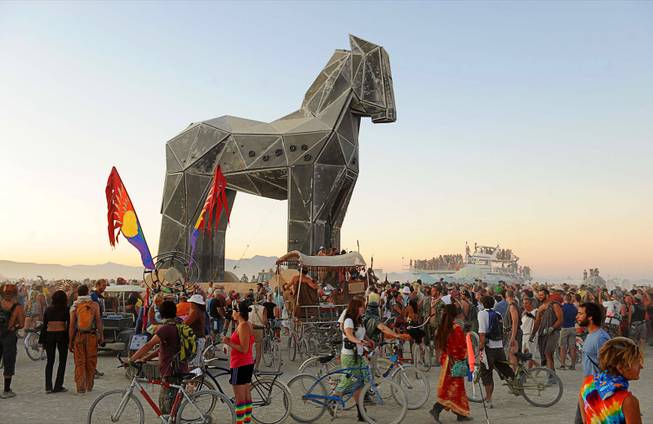
Andy Barron / Reno Gazette-Journal
People gather around the Trojan Horse as it is pulled across the “playa” at the Burning Man festival in Gerlach, Nev., on Friday, Sept. 2, 2011.
Friday, March 8, 2013 | 2 a.m.
Sun coverage
Each year, Burning Man draws 60,000 people to the Black Rock Desert north of Reno to participate in a weeklong counterculture art festival.
Admittance to the bohemia isn’t free, though. You need to buy a $380 ticket.
Now, some Democratic legislative leaders are looking at the ticket proceeds and wondering why the state doesn’t get a cut.
“It’s how many people and they pay how much?” Senate Majority Leader Mo Denis, D-Las Vegas, said. “I definitely think we ought to look at that.”
Here’s some quick math: 60,000 tickets sold at $380 a pop equals $22.8 million. Apply the state’s 5 percent live entertainment tax to the proceeds and the state could net $1.14 million from that event.
The problem: Burning Man is exempt from the live entertainment tax.
Since its creation in 2003, the live entertainment tax — generally assessed on such things as live concerts, dance performances and theater productions — has become one of the more squirrelly levies to administer, as regulators struggle to define “live performance.”
It’s also become a popular tax from which to seek an exemption.
For instance, a concert held outdoors is not subject to the tax. That same band plays indoors, and the state collects money.
NASCAR? It earned an exemption in 2007.
A wandering minstrel entertaining diners at a restaurant? Not a live performance.
A baseball game? No tax.
Burning Man, despite selling tickets for admittance, qualifies for an exemption because it is considered an art festival and because it is held outdoors.
In Southern Nevada, the massive Electric Daisy Carnival, which drew an estimated 230,000 concertgoers last year, also is exempt from the tax because it is held outdoors.
That grates on Assembly Speaker Marilyn Kirkpatrick, D-North Las Vegas, who has launched an effort to simplify the live entertainment tax and make sure it’s applied more uniformly.
And she’s got her eye on events such as Burning Man and the Electric Daisy Carnival.
“Yes, they should pay it,” she said emphatically this week. “I am going to clean up the law.”
That’s not welcome news to Burning Man organizers, who visited Carson City this week to talk with lawmakers about the economic activity the event generates in Northern Nevada.
“We already provide so much money to the state of Nevada for our event,” Raymond Allen, Burning Man’s government relations manager, said when asked if organizers would be willing to pay the live entertainment tax. “It doesn’t seem to apply to us. We fall into a different category. It’s a city.”
Allen estimated the event pays about $4.5 million in fees each year to local, state and federal government entities.
Burning Man also is fending off efforts by Pershing County to increase the fees for law enforcement.
“Many agencies would like to tax us,” Allen said. “We’re afraid if one starts, they’ll all start. They could tax us right out of existence.”
“Out of existence in Nevada,” added Burning Man lobbyist Tom Clark, saying the event could be held anywhere in the world, including “Siberia.”

Join the Discussion:
Check this out for a full explanation of our conversion to the LiveFyre commenting system and instructions on how to sign up for an account.
Full comments policy